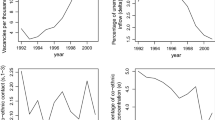Abstract
Although there is some considerable empirical research on the economic assimilation of migrants to the labor markets of the host countries, little or no analysis exists on the social assimilation and integration of migrant workers. This is surprising since the integration of migrants is not only of political importance, but it should strongly interact with their economic behavior. This paper provides an empirical analysis of the determinants of migrants’ integration, using data for Germany. Ordered probit models are estimated, where the dependent variable is an ordered response on the feeling of national identity. The results show that personal characteristics, the nationality and the family context affect the migrant’s integration, while labor market variables appear to be quite unimportant.
Similar content being viewed by others
References
Abbot, Beach (1993) Immigrant earnings differentials and birth-year effects for men in Canada: Post- War — 1972. Can J Econ 26:505–524
Beggs JJ, Chapman BJ (1989) Immigrant wage adjustment in Australia: cross section and time-series estimates. Econ Record 161–167
Beenstock M (1993) Learning Hebrew and finding a job: econometranalysis of immigrant absorption in Israel Paper presented at the CEPR-conference. The Economics of International Migration: Econometric Evidence, Konstanz, 26/27 February 1993
Smith RJ, Blundell RW (1986) An exogeneity test for a simultaneous equation tobit model with an application to labor supply. Econometrica 54:679–685
Borjas GJ (1985) Assimilation, changes in cohort quality, and the earnings of immigrants. J Labor Econ 3:463–489
Borjas GJ (1987) Self-selection and the earnings of immigrants. Am Econ Rev 77:531–553
Borjas GJ (1989) Immigrant and emigrant earnings: a longitudinal study. Econ Inquiry 27:21–37
Carliner G (1981) Wage differences by language group and the market for language skills in Canada. J Human Resources 16:384–399
Carliner G (1980) Wages, earnings and hours of first, second and third generation American males. Econ Inquiry 87–102
Chiswick BC (1978) The effect of Americanization on the earnings of foreign-born men. J Polit Econ 86:897–921
Chiswick BR (1991) Reading, speaking, and earnings among low-skilled immigrants. J Labor Econ 9:149–170
Chiswick BR, Miller P (1985) Immigrant generation and income in Australia. Econ Record 540–553
Chiswick BR, Miller P (1992) Language in the immigrant labor market. In: Chiswick BR (ed) Immigration, Language and Ethnicity: Canada and the United States (Forthcoming)
Chiswick BR, Miller P (1993) The endogeneity between language and earnings: an international analysis. Paper presented at the CEPR-conference. The Economics of International Migration: Econometric Evidence, Konstanz, 26/27 February 1993
Dustmann C (1993) Earnings adjustment of temporary migrants. J Popul Econ 6:153–168
Dustmann C (1994a) Speaking fluency, writing fluency and earnings of migrants. J Popul Econ 7:133–156
Dustmann C (1994b) Return intentions of migrants: theory and evidence. CEPR Discussion Paper No 906
Dustmann C (1994c) Differences in labor market behavior between temporary and permanent migrant women. CEPR Discussion Paper No 947
Grenier G (1984) The effect of language characteristics on the wages of Hispanic American males. J Human Resources 19:35–52
Heckman JJ (1979) Sample selection bias as a specification error. Econometrica 47:153–161
Kossoudji SA (1988) English language ability and the labor market opportunities of Hispanic and East Asian immigrant men. J Labor Econ 6:202–228
Long JE (1980) The effect of Americanization on earnings: some evidence for women. J Polit Econ 88:620–629
McManus W et al (1983) Earnings of Hispanic men: the role of English language proficiency. J Labor Econ 1:101–130
Meng R (1987) The earnings of Canadian immigrants and native-born males. Appl Econ 19:1107–1119
Pischke JS (1993) Assimilation and the earnings of guestworkers in Germany. Discussion Paper, University of Mannheim
Rivera-Batiz F (1990) English language proficiency and the economic progress of immigrants. Econ Lett 34:295–300
Rivera-Batiz F (1992) English language proficiency and the earnings of young immigrants in U.S. labor markets. Policy Studies Rev 11:165–175
Rivera-Batiz F (1993) English Language Proficiency, Quantitative Skills and the Economic Progress of Immigrants. Paper presented at the Middlebury College Conference on Immigration, Middlebury, Vermont
Schmidt CM (1992) Country-of Origin Differences in the Earnings of German Immigrants. Discussion Paper, University of Munich, No 92-29
Schmitter Heisler B (1992) The Future of Immigrant Incorporation: Which Models? Which Concepts? International Migration Review
Licht G, Steiner V (1992) Assimilation, labour market experience, and earnings profiles of temporary and permanent migrant workers in Germany. Mimeo, ZEW, Mannheim
Tainer E (1988) English language proficiency and the determination of earnings among foreign-born men. J Human Resources 23:108–122
Veltman C (1988) Modeling the Language Shift Process of Hispanic Immigrants. International Migration Review 22:545–562
White H (1980) A heteroscedasticity-consistent covariance matrix estimator and a direct test for heteroskedasticity. Econometrica 48:817–838
Author information
Authors and Affiliations
Rights and permissions
About this article
Cite this article
Dustmann, C. The social assimilation of immigrants. J Popul Econ 9, 37–54 (1996). https://doi.org/10.1007/PL00003825
Received:
Accepted:
Issue Date:
DOI: https://doi.org/10.1007/PL00003825



